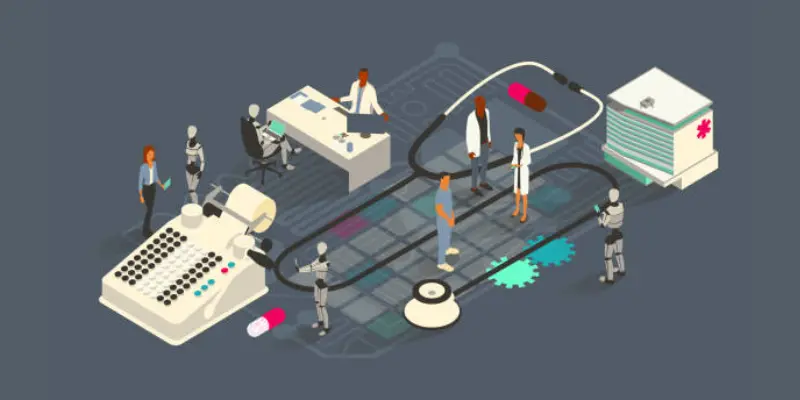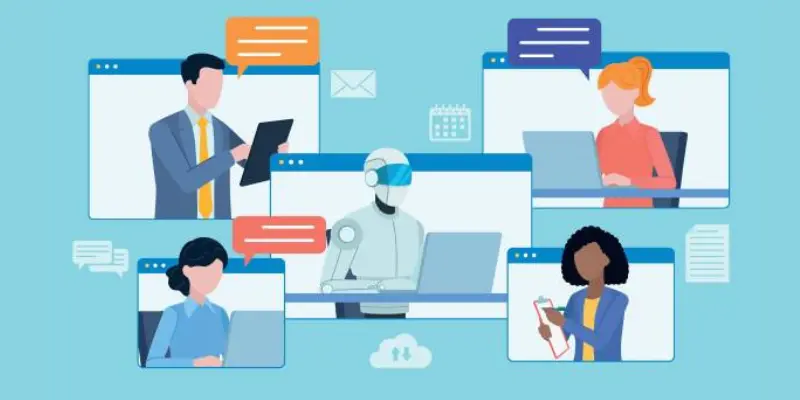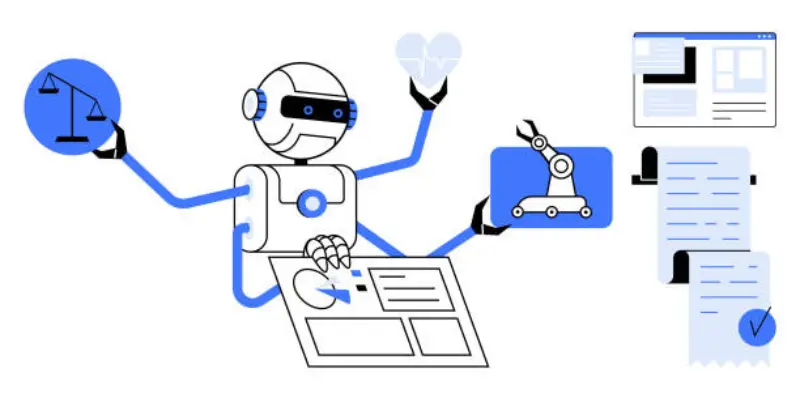The Role of AI in Healthcare Administration: A Comprehensive Guide
Published: 21 Mar 2025
Why do hospitals still struggle with long wait times, billing errors and overwhelming paperwork when AI can automate these tasks? Many healthcare facilities are adopting AI in healthcare administration to streamline operations, yet some still hesitate. Is AI the game-changer that industry needs or is it just another tech buzzword? Let’s break it down.

Table of Contents
What is AI in Healthcare Administration?
AI in healthcare administration means using smart technology to handle everyday tasks in hospitals and clinics. It helps with appointment scheduling, medical billing, patient records and hospital management. Instead of relying only on human staff, AI-powered systems speed up processes, reduce errors and improve efficiency.
How Does AI Work in Healthcare Administration?
AI uses machine learning, automation and data processing to manage administrative tasks. For example:
- AI chatbots can schedule patient appointments without human intervention.
- AI-powered billing systems can detect errors and prevent claim rejections.
- Smart algorithms can analyze hospital data to optimize resource allocation.
Why is AI Important for Healthcare Administration?
Healthcare administrators spend too much time on paperwork and manual tasks. This slows down hospital operations and also increases costs. AI solves this problem by handling routine work, allowing healthcare professionals to focus on patient care instead of paperwork.
Example: A hospital using AI for billing can process insurance claims faster and with less errors and reduced financial losses.
By automating repetitive tasks, reducing mistakes and improving workflow efficiency, AI is changing how hospitals and clinics operate.
Key Applications of AI in Healthcare Administration
AI is revolutionizing healthcare administration by handling tasks that once required hours of manual work. From scheduling appointments to managing medical records, AI improves efficiency and reduces errors. Now we will discuss key areas where AI is helping the hospital administrators.

A. AI for Scheduling & Appointments
Managing appointments manually often leads to double bookings, long wait times and frustrated patients. AI-powered scheduling systems solve this by:
- Automating appointment bookings through chatbots and voice assistants.
- Reducing patient wait times by predicting the best time slots.
- Sending automated reminders to reduce no-shows.
💡 Example: Many hospitals now use AI chatbots to help patients book appointments online, cutting down phone calls and administrative workload.
B. AI in Medical Billing & Insurance Claims
Billing errors and rejected insurance claims cost hospitals millions every year. AI makes the process smoother by:
- Detecting errors in billing codes before claims are submitted.
- Automating claim processing to reduce paperwork.
- Identifying fraudulent claims using AI-powered fraud detection systems.
💡 Example: Some AI tools scan patient records and flag inconsistencies in billing which prevents costly mistakes.

C. AI-Powered Electronic Health Records Management
Handling patient records is time-consuming and manual data entry often leads to errors. AI improves this by:
- Automatically updating and organizing electronic health records.
- Extracting data from handwritten notes, voice recordings and medical charts.
- Providing quick access to patient history for doctors and staff.
💡 Example: AI-powered transcription tools convert doctor’s voice notes into structured patient records, saving time.
D. AI in Hospital Workflow Optimization
Hospitals must manage staff, bed availability, and patient flow efficiently. AI helps by:
- Predicting patient admissions based on past trends.
- Optimizing staff schedules to prevent overwork.
- Managing hospital beds and emergency room capacity.
💡 Example: AI models can predict peak hospital hours and recommend better staff allocation hereby ensuring smooth operations.
E. AI in Inventory & Supply Chain Management
Running out of critical medicines or medical supplies can be dangerous. AI ensures hospitals always have what they need by:
- Tracking inventory levels in real-time.
- Predicting supply shortages before they happen.
- Automating orders for essential medical equipment.
💡 Example: AI systems in some hospitals automatically reorder medicines when stock reaches a low level and prevent shortages.
AI is redefining healthcare administration by making processes faster, smarter and more efficient. With automated scheduling, billing and records management, hospitals can focus more on patient care and less on paperwork.
Benefits of AI in Healthcare Administration
AI is helping in healthcare administration by reducing workload, improving accuracy and cutting costs. Hospitals and clinics using AI can process tasks faster, reduce errors and enhance patient experiences. Let’s explore the major benefits.
| Advantages |
|---|
A. Faster ProcessesManual tasks like appointment scheduling, billing and patient record updates take up too much time. AI speeds up these processes by:
Example: A hospital using AI scheduling systems can cut patient wait times by 50% and can do smooth operations. B. Fewer Errors in Administrative WorkHuman errors in billing, record-keeping or scheduling can lead to costly mistakes and patient dissatisfaction. AI reduces these risks by:
Example: AI-driven billing systems reduce claim rejections, helping hospitals recover revenue faster. C. Cost Savings for Hospitals & ClinicsAdministrative inefficiencies lead to wasted resources and higher operational costs. AI helps by:
Example: AI can save hospitals millions of dollars each year by preventing fraudulent claims and administrative errors. D. Better Patient ExperiencePatients expect fast and hassle-free healthcare services. AI enhances their experience by:
Example: AI-powered chatbots assist patients 24/7, answering questions and guiding them through hospital services without delays. |
AI in healthcare administration is a game-changer which is speeding up processes, reducing errors, cutting costs and improving patient care. Hospitals that adopt AI operate more efficiently and deliver better services.
Drawbacks of AI in Healthcare Administration
While AI is revolutionizing healthcare administration, it also comes with challenges that hospitals and clinics must address. These include data privacy concerns, high costs and staff resistance to AI adoption. Let’s find out the challenges and their solutions in detail.
| Disadvantages |
|---|
A. Data Privacy & Security RisksAI systems handle sensitive patient data which makes security a top concern. Risks include:
Solution: Hospitals must use strong encryption, regular security audits and strict access controls to protect patient data. B. High Implementation CostsAI-powered systems require advanced technology, skilled staff and maintenance which can be expensive. Challenges include:
Solution: Hospitals can start with cost-effective AI solutions like chatbots and gradually scale up as they see benefits. C. Staff Resistance & Training IssuesHealthcare workers may fear job loss or struggle to adapt to AI tools. Common issues include:
Solution: Hospitals must train staff, provide AI education and highlight AI’s role in assisting rather than replacing workers. D. Integration with Existing SystemsMany hospitals use older software that may not be compatible with AI. Challenges include:
Solution: Healthcare facilities should work with AI vendors who offer seamless integration solutions and ensure the step-by-step implementation plans. |
Read more about AI in Healthcare: Should AI bed used in Healthcare?
Real Life case studies on AI in Healthcare Administration
AI is not a concept, it is making progress in healthcare in the form of lowering costs and managing time for hospitals and clinics all over the world. Some examples are;
1. Apollo Hospitals (India): Enhancing Staff Efficiency with AI
- Challenge: High workload on medical staff due to manual administrative tasks.
- Solution: Implemented AI tools to automate tasks like medical documentation and scheduling.
- Outcome: Freed up 2-3 hours daily for doctors and nurses, allowing more focus on patient care.
Source: Reuters
2. NIB Health Insurance (Australia): Improving Customer Service with AI
- Challenge: High demand for customer service leading to increased operational costs.
- Solution: Deployed an AI-driven digital assistant named “Nibby” to handle customer inquiries.
- Outcome: Achieved $22 million in savings and reduced the need for human customer service support by 60%.
Source: The Australian
3. Healthfirst (USA): Streamlining Data Processes with AI
- Challenge: Managing and analyzing large volumes of healthcare data efficiently.
- Solution: Partnered with ClosedLoop to implement AI for automating data cleaning, normalization and model training.
- Outcome: Accelerated analytics implementation and enhanced clinical workflows.
Source: VKTR.com
4. Pediatric Surgery Assistance: Enhancing Precision with AI
- Challenge: Performing delicate surgeries on young patients requiring high precision.
- Solution: Utilized AI-driven robotic systems such as the da Vinci Surgical System to assist surgeons.
- Outcome: Improved surgical precision and patient outcomes in pediatric procedures.
Source: DigitalDefynd
5. Diabetic Retinopathy Screening: Automating Diagnosis with AI
- Challenge: High costs and limited manpower for widespread diabetic retinopathy screening.
- Solution: Developed automated AI algorithms to analyze retinal images for early detection.
- Outcome: Demonstrated robust diagnostic performance and cost-effectiveness in screening programs.
Source: PMC
These case studies illustrate how AI is being effectively integrated into healthcare administration to enhance efficiency, reduce costs
Future of AI in Healthcare Administration
AI is rapidly evolving and its role in healthcare administration will only expand. Future advancements will focus on better automation, predictive analytics and smarter decision-making tools. Let’s dive in and find out what’s next for AI in healthcare administration.
A. Fully Automated Administrative Processes
In the future, AI will take over most routine administrative tasks, allowing healthcare staff to focus more on patient care. Expected improvements include:
- AI-driven virtual assistants will handle scheduling, billing and patient inquiries globally.
- Voice recognition AI, automatically transcribing doctor-patient conversations into medical records.
- AI chatbots that will provide instant insurance claim updates and support.
B. AI-Powered Predictive Analytics
Hospitals will use AI to predict administrative challenges before they happen, leading to better resource planning and cost savings. AI will help by:
- Forecasting patient admission rates to optimize staff and bed availability.
- Predicting insurance claim approvals or rejections before submission.
- Analyzing trends to reduce hospital operational costs.
C. Blockchain & AI for Secure Patient Data Management
Data privacy concerns will push hospitals to combine AI with blockchain technology for better security. Future advancements include:
- Decentralized AI systems that prevent unauthorized data access.
- Real-time fraud detection in billing and insurance claims.
- AI-enhanced encryption to protect patient records from cyber threats.
D. AI & IoT Integration for Smart Hospital Management
Hospitals will integrate AI with IoT devices for real-time monitoring and automation. AI-powered IoT applications will:
- Track hospital equipment usage and alert staff when maintenance is needed.
- Monitor real-time patient flow and adjust resource allocation accordingly.
- Automate climate control, lighting and energy consumption in hospitals for efficiency.
E. Ethical AI & Regulatory Compliance
As AI becomes more advanced, healthcare systems make sure that it is fair, unbiased and compliant with regulations. Future developments will focus on:
- AI models trained to remove bias in administrative decisions.
- Strict AI governance policies to align with healthcare laws.
- Greater transparency in AI decision-making.
AI is set to revolutionize healthcare administration further by bringing together automation, predictive analytics, enhanced security and smart hospital management. As AI advances, healthcare facilities must adapt, innovate and ensure ethical AI use.
Conclusion
So guys, in this article, we’ve covered AI in healthcare administration in detail. From faster scheduling to predictive analytics, AI is changing how hospitals and clinics operate. My recommendation is to Stay informed and embrace AI gradually. Start by identifying one administrative task that AI could improve in your organization. Whether it’s billing, patient records or workflow automation, taking that first step can save time and boost efficiency. What AI solution would you like to try first? Let’s discuss in the comments!
More Queries?
Here is a list frequently asked questions that confuse reader while exploring the the role of AI in Healthcare administration;
AI automates repetitive tasks like scheduling, billing and patient record management. It reduces errors, saves time and improves efficiency in hospitals and clinics. This helps healthcare workers to focus more on patient care instead of paperwork.
No, AI is not replacing jobs but assisting healthcare staff by handling routine tasks. It helps workers do their jobs faster and more accurately. Instead of job losses, AI is creating new opportunities for professionals to manage and optimize AI systems.
The main challenges include data security risks, high costs and staff resistance to AI adoption. Some hospitals also struggle with integration of AI into old systems. However, proper training, security measures and phased implementation can overcome these issues.
Yes, but only if hospitals use strong security measures. AI systems must follow strict privacy laws like HIPAA to protect patient information. Encryption, secure access and regular audits help keep patient data safe.
Yes! Many AI tools are affordable and scalable for small clinics to start with basic automation like chatbots for patient queries. Over time, they can invest in more advanced AI solutions as they see benefits.
AI reduces manual workload by automating scheduling, staff management and document processing. It also predicts patient admission trends to optimize resource planning. This results in faster operations and fewer delays in healthcare services.
AI will become more advanced, predictive and automated. Hospitals will use AI for smart scheduling, real-time data tracking and blockchain based security. In the future, AI may even handle fully automated hospital management.
Hospitals should offer AI training programs to help staff learn how to use AI tools effectively. Workshops, hands-on practice and AI assistants can make the transition smoother. The key is to show how AI helps rather than replaces healthcare workers.
Yes! AI speeds up medical billing and insurance claims while reducing errors. With machine learning, AI can detect fraud, verify claims and ensure accuracy in financial processes.
Start small by automating simple tasks like appointment scheduling or document scanning. Then gradually expand AI adoption into billing, staff management and patient record systems. Choosing user-friendly AI solutions ensures a smooth transition.





